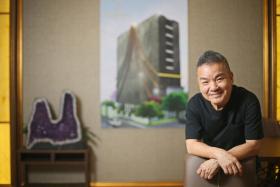Columbarium caretakers: There's nothing bad about living with or near the dead
On most days, it's a simple meal of chicken rice or chap chye png (mixed economy rice) in styrofoam containers.
But on festive occasions such as Chinese New Year or the Qing Ming festival, it can be quite a spread.
Roast pork, suckling pig pieces, laksa, mee siam, muah chee, ang ku kueh, mangoes, cherries and sometimes, durians too.
It sounds like quite a feast until you realise that it's food offered to the dead at their niches, say caretakers at two different columbariums.
They request that we do not use their full names as they don't wish to upset any family members.
Says one, whom we'll refer to as Ms Zhu: "Sometimes there is a whole roast duck too, but people don't usually leave it behind."
She adds: "Why waste it?"
If they do leave it behind, the cleaner at a columbarium in the north of Singapore has to dispose of the food at the end of the day.
Ms Zhu, 50, says in Mandarin: "Someone has to clear the food eventually, if not the birds will get to them."
Uncle Chong, who takes care of a columbarium in the western part of Singapore, declares matter-of-factly: "We look after all the niches here, and when we eat the food, it's like getting the blessings from them (the dead)."
The food offerings for the deceased are usually their favourite items when they were alive. Often, their loved ones leave them behind.
Ms Zhu says: "During the special occasions, there's just too much food left behind."
Uncle Chong, 63, admits that sometimes, he even takes some home for his four grandchildren.
He says: "I don't think any one really minds, and my grandchildren (who live with me) are happy with the treats."
But Ms Zhu is quick to clarify: "It's not like we work here just to eat the food."
FEW VISITORS
She and another colleague are responsible for cleaning the area where trash is disposed, and making sure the niches are kept tidy.
It takes two cleaners to look after the entire columbarium.
They don't require more people because, except on special occasions, few people visit.
Are they afraid of ghostly encounters?
Uncle Chong laughs, then says: "I sleep here on some nights and I can tell you that in the 12 years I've worked here, it has been very peaceful."
Ms Zhu, who has worked at the columbarium for two years, also said she has never seen ghosts or had supernatural encounters.
She is more intimidated by the crowd of visitors who swarm the area three times a year: During Chinese New Year, Qingming and the Hungry Ghost Festival.
But she manages to cope because her employer increases the number of cleaners during peak periods.
Of course, the workload increases and there is more cleaning to be done.
Ms Zhu says: "People will offer incense and burn effigies, like paper cars and paper houses. They're getting bigger too so the smoke and ash produced can be quite a lot.
"When a few thousand people come down here, there's a lot to do."
Ms Zhu and her colleague work from 8am to 5pm. They clear the floors of ash and dust, make sure no food is left overnight and remove wilting flowers from the niches.
At 5pm, they shutter up the place after making sure that no one is still in the columbarium. They're paid about $1,000 a month for the work.
An office nearby serves as a resting area for the cleaners.
Ms Zhu is aware of the Fernvale columbarium debate, and feels working in or living next to a columbarium is no big deal.
"There's really nothing much that happens here," she says.
We look after all the niches here, and when we eat the food, it’s like getting the blessings from them (the dead).
- Uncle Chong
Get The New Paper on your phone with the free TNP app. Download from the Apple App Store or Google Play Store now



